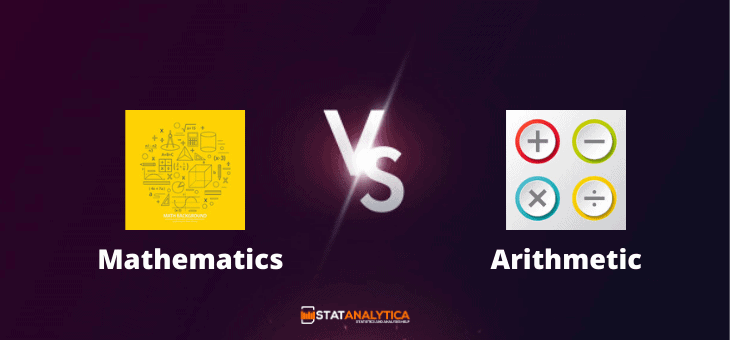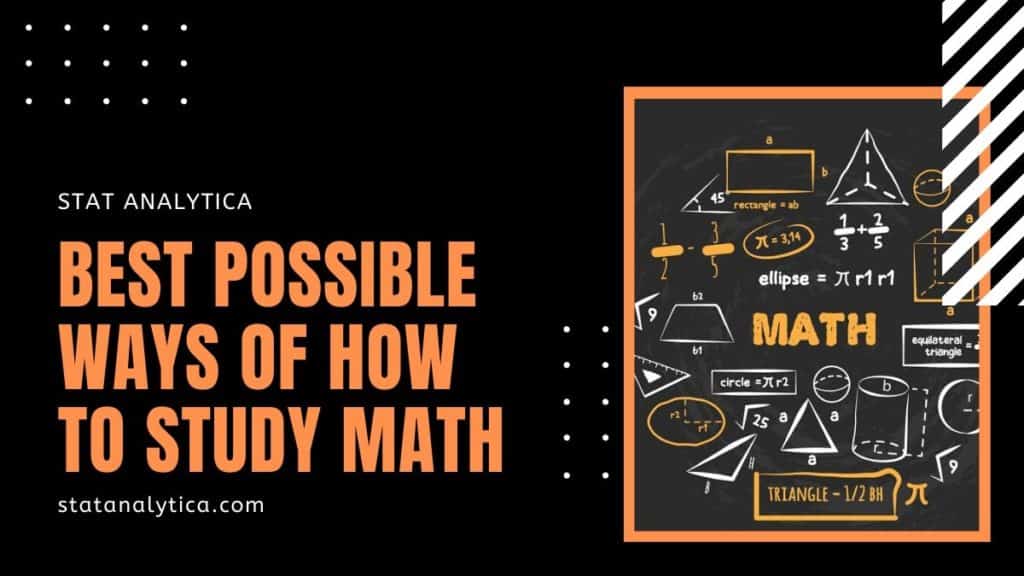Sometimes people think arithmetic and mathematics are the same. But there is some difference between Arithmetic vs Mathematics. Here you will know Arithmetic vs Mathematics: The Comparison You Should Know.
Arithmetic vs Mathematics
Table of Contents
What is Arithmetic?
Arithmetic is the branch of mathematics that deals with studying numbers by using various operations on them. The basic operations of maths are addition, subtraction, multiplication, and division.
Various functions are used in the part of mathematics using a lot of operations on them. Some of the common operations are Subtraction, Division, Addition, and Multiplication.
Addition
- Adding the two or more numbers is known as the Addition. Or you can say that the sum of all numbers is Added. The result of addition always gives the numbers which are added.
For Example: If you have three pens and then you buy four more pens then how many pens are there in total?
The following mathematical impression is shown:
3 + 4 = 7; Thus, 7 pens are in total.
Subtraction
- Removing the things from the group is Subtraction.
- The numerical value of the original is becoming less.
For Example: If 5 dogs are in the streets and 2 are going away, How many now there
5– 2 = 3; Thus, there are only 3 dogs.
Multiplication
- A number of times adding the same number is Multiplication.
- If you multiply two numbers then the result is the product.
For Example:
There are 4 flowers with 8 petals each. To find the total number of petals.
Thus, the product is 4 × 8 = 32, there are 32 petals in all.
Division
- Dividing a big thing or collection into smaller ones is division.
- The large number is a dividend.
- The divisor is the number that divides the dividend.
- The obtained number after division is the divisor.
For Example:
There are 20 pieces of candy that you want to share among 5 people equally. How can you do that?
For this, divide 20 ÷ 5 = 4, all five people get 4 candies each.
What is Mathematics?
In mathematics, logic, shapes, arrangement, and quantity are the things that are about to learn. Math is part of our daily life. In everything like daily tasks, mobile phones, making art, communications, banking, music, and all other things, math is used.
From history, math is one of the best things which gives an excellent direction to development. The need for math depends on society, but today a lot of work is done by using math. If an organization is compact, the math of the community is also small. In the beginning, when tribes are here, humans use the little math to count and also use to see the position sun, and in hunting, they use physics.
History of mathematics
In most of the countries like India, America, and others, give the real math which we use today. Counting was provided by the Sumerians, which now help to do all the world’s daily tasks. The everyday operations are used in the Arithmetic like multiplying, dividing, addition, and subtraction.
In 300 B.C. Sumerians they pass the counting arrangement to Akkadians. After this, new concepts are added in mathematics like calendars, astronomers, etc. And the most important thing discovered by this is zero, and the whole number system is changed after this.
What is the difference between Arithmetic and Mathematics?
Now we will discuss the difference between Arithmetic vs Mathematics.
First I will tell you that Arithmetic is the branch of mathematics but Math is a vast subject of calculations and variables.
So that here you will know a lot of differences between arithmetic and mathematics.
a·rith·me·tic
(1) The part of arithmetic that manages expansion, subtraction, augmentation, and division.
(2) Using the numbers we can solve our daily life’ basics.
math·e·mat·ics
(1) Mathematics is about relations logic, numbers, and much more.
(2) It utilizes signs, images, and proofs and incorporates number-crunching, variable-based math, analytics, geometry, and trigonometry.
The most evident distinction is that number-crunching is about numbers and science is about the hypothesis. In school, I have a striking memory of Linus Pauling¹ conveying a visitor address, and subsequent to scribbling hypothetical science all more than three chalkboards, an understudy lifted his hand and brought up that multiple times 8 had been duplicated wrong in one of the previous advances.
Pauling’s answer was, “Goodness, that… numbers are only placeholders for the idea.” And, he just waved away the way that the numerical end was clearly not precise. Presently, that was in the sixties before the abundant access to adding machines and PCs, so his point is considerably increasingly legitimate today.
Getting familiar with the hypothesis in science and adding machines and PCs will keep you exact. All things considered, it is essential to stretch that adding machines has their place in our kids’ instruction yet not to the avoid their understanding the material with their own mind.
Algebra and Trigonometry
Undoubtedly, both number Algebra and Trigonometry are conceptual. There is a section in “Zen and the Art of Motorcycle Maintenance” where a dad and his 9-year-old child are voyaging cross country on a cruiser and as they go through a barren wasteland nation, the dad is discussing apparitions with his child. His child at that point inquires as to whether he, the dad, trusts in apparitions.
The dad answers unexpectedly and rapidly with “obviously, not!” Then, he contemplates it and he discloses to his child that possibly he does put stock in apparitions since he has faith in the number framework and it is a phantom. A phantom is non-concrete, can’t be contacted nor felt, has no weight, no mass. What are numbers?
They are images with importance append to them… and, for a few, interfacing the images with the real checking process is unique. At the point when we take a gander at antiquated Egyptian numbers, they are inane images to us except if we have set aside the effort to examine and interface the image with its planned significance.
Having gone through the vast majority of my time on earth showing secondary school math, it was discouraging to hear my uncle state that what I am instructing isn’t “genuine math” – his reality was showing the math of particle³ material science to cutting edge graduate understudies at Stanford University.
Just a bunch of individuals on the planet comprehended the papers he composed. His meaning of number-crunching is that it is organizing and that math isn’t – in his brain, checking through analytics is number-crunching. The hypothetical math in his papers was hogwash to me yet emblematic composition to him – the “marriage” of math and science. From his perspective, until you find a good pace, the math isn’t “genuine” math. The point of view is everything.
Some more differences Between Mathematics and Arithmetic
So, to make things easier for you, we have made a table with the main differences between arithmetic and mathematics.
| S NO. | Mathematics | Arithmetic |
| 1 | Mathematics is about relations, logic, numbers, and much more. | The part of Mathematics that manages expansion, subtraction, augmentation, and division. |
| 2 | Mathematics is the study of measurements and properties of quantities. | Use numbers for calculation. |
| 3 | Mathematics application is applied only in professional settings that require technical ability. | Arithmetics application applied in all walks of life. |
| 4 | We can’t interchange mathematics with arithmetics. | Whereas, arithmetics is interchangeable with maths. |
| 5 | Mathematics deals with geometry | But, arithmetic does not deal with geometry. |
| 6 | We can say that Mathematics is all about theories. | On the other hand, arithmetics is all about numbers and calculations. |
| 7 | Operations used in mathematics are: Calculus, Trigonometry, Geometry, Algebra. | Operations used in Arithmetics are: Addition, Subtraction, Multiplication, Division. |
Career Path for Those Who Love Maths
Below are five career paths for those who love Maths. The salary expectation of the below career is based on Glassdoor in the United States.

Financial Analyst
There are many types of financial analysts like the fund manager, portfolio manager, risk analyst, and rating analyst. Financial analysts can make $46k to $90k per annum.
Statistician
There are a variety of fields in statistics like business, engineering, and science. The average salary of a statistician is about $88,000 annually.
Economists
Economists study the distribution and production of goods and resources by collecting data and analyzing them. As an economist, you can earn up to $52k to $140k annually as per the experience.
Actuary
An Actuaries analyzer can make up to $102,392 annually. Actuaries study or analyze the financial costs of risks with the help of maths, statistics, and financial theory.
Cryptographer
Making and breaking codes and coming up with more effective ways to keep sensitive data safe from malicious hackers makes this one of the best jobs for maths majors with no experience. Cryptographers can make between $48k to $120k, depending on your experience.
Conclusion
Arithmetic and Mathematics are different from each other because arithmetic is all about numbers, but in mathematics, variables are also included. Hence this is these are the difference that makes you clear your all doubts about Arithmetic vs Mathematics. If you want online math homework help then you can get my math homework helpers here.
FAQs
Q1. What are the Branches of Mathematics?
Ans. Different Branches of Mathematics are as follows:
1. Algebra
2. Arithmetic
3. Geometry
4. Trigonometry
5. Analysis
Q2. What is the difference between Applied math vs math?
Ans. Mathematics involves using pure numbers. On the other hand, applied mathematics involves quantities such as numerical values and units of measurement. Applied mathematics is also used in practical applications in day-to-day life. In comparison, mathematics is the study of principles without much practical application.


